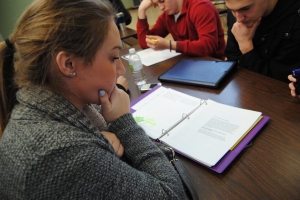While studies have shown that hyper-stimulation – caused by stress, nervousness and pressure – can negatively affect an athlete’s performance, the same thing can happen to students while studying or taking an exam.
Whether you’re preparing for your college mid-terms, high school finals or SATs, stress can sometimes cause even the best students to “choke” under pressure. Some top-notch students excel in their Advanced Placement classes, but paradoxically end up with a perplexingly sub-par score on the SATs. Trying to find “the zone” between overstimulation and lack of enthusiasm is the key. And on major exams, especially for dedicated students, the former tends to be more of a problem.
 So, what kinds of stress-busting techniques can help you ace that final exam? Denise Zack, a counselor in Southern’s University Counseling Office, says there are some general tips that can help most individuals, and also some specific stress reduction suggestions based on how stress affects you.
So, what kinds of stress-busting techniques can help you ace that final exam? Denise Zack, a counselor in Southern’s University Counseling Office, says there are some general tips that can help most individuals, and also some specific stress reduction suggestions based on how stress affects you.
“Certainly you want to try to stay on a regular and healthy schedule as far as eating, sleeping and studying is concerned,” she says.
But Zack also offers other general tips on de-stressing, such as:
*Don’t forget to breathe. It sounds silly, but you would be amazed at how many people hold their breath for extended periods of time. That prevents optimal amounts of oxygen from getting to the brain and the body. Try deep breathing exercises to help relax further.
*Pet therapy. Studies have shown that just petting your dog or cat can lower your blood pressure, reduce your heart rate and elevate your mood. There is a reason why therapy dogs can be found in hospitals and nursing homes. But dogs don’t discriminate – they will help people of all ages.
*Quiet your mind. No, that doesn’t mean yelling “shut up” to your brain. (That move might create a whole new set of stressors in your life, or indicate a much deeper problem.) Instead, try to focus on the present. Are you comfortable? Is there any imminent danger? The answer is usually no.
Zack also notes that some techniques are more effective at dealing with stress that affects you physically or behaviorally, while other methods are better at helping people cope with the emotional or cognitive. Someone affected physically might be getting stiff necks or increased fatigue, while those affected emotionally might find themselves crying or getting agitated more quickly than normal.
Zack suggests the following to deal with the physical aspects of stress:
*Exercise. Walking, jogging, swimming, or almost anything that gets your blood pumping can be helpful.
*Yoga. Not all of us are capable of bending ourselves into a pretzel, but any sort of stretching — gentle stretches for at least 20-30 seconds at a clip — can reduce physical signs of stress, as well.
*Take a warm shower. It sounds simple, but it can help increase blood flow to the part of the body that may be bothering you. That reduces pain and stress.
She suggests the following to deal with stress that affects you psychologically:
*Talk it out. Chatting with a trusted friend or family member can help lower cognitive stress levels.
*Write it out. In a similar way, writing in a journal can be cathartic and provide stress relief.
*Watch a movie in a warm blanket with some hot chocolate. It may sound like one of those after school TV movies, but it can work effectively. Humor, comfort foods and a relaxed atmosphere make a wonderful trifecta.
(For a look at an example of pet therapy, check out the video below of a de-stress program offered at Southern a few days before the start of final exams. Students were able to interact with dogs of various sizes and breeds.)
Tags: de-stress, exam, pet therapy, studying, test




